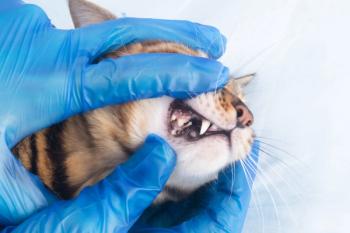
Journal Scan: Treatment of primary epilepsy in cats-how well does it work?
This review studied the outcome of cats treated with either phenobarbital or a combination of other antiepileptic drugs with respect to the number of seizures per year and quality of life.
Untitled Document
Why they did it
There are little data in the veterinary literature about the long-term treatment of cats with primary epilepsy. The authors review the outcome of cats treated with either phenobarbital or a combination of other antiepileptic drugs with respect to the number of seizures per year and quality of life.
What they did
The study authors reviewed the medical records of 36 cats with recurrent seizures between 2001 and 2009. Primary epilepsy was diagnosed if the results of a complete work-up, which included clinical and neurologic examinations, hematologic and serum biochemical testing, cerebrospinal fluid analysis, and intracranial magnetic resonance imaging, were normal or if the work-up was not complete but more than one year had passed since seizure onset without any interictal neurologic deficits. Inclusion in the study required follow-up information for at least one year after beginning therapy, which included seizure type, duration, severity, and frequency; treatment side effects; and quality of life. The number of seizures per year was categorized into four groups:
- Seizure-free: excellent control
- 1 to 5 seizures per year: good control
- 6 to 10 per year: moderate control
- > 10 seizures per year: poor control
What they found
The mean age at the time of seizure onset was 4.8 years (standard deviation ± 3.51, range six months to 11 years). Half of the included cats had seizures more than 10 times a year before therapy was initiated, 11 cats had two to five seizures/year, and seven cats had six to 10 seizures/year.
Initial treatment in all cases was phenobarbital at a mean dose of 3.19 mg/kg/day. At the time of final check-up, this dose was 6.76 mg/kg/day on average. In four cats, other drugs such as diazepam, gabapentin, or levetiracetam were added to the treatment regimen. Duration of therapy averaged 1,490 days (range 365 to 4,750). The mean phenobarbital concentration was similar between seizure-free and non-seizure-free cats (27.9 vs. 31.2 µg/ml, respectively; P = 0.624); however, the correlation between serum phenobarbital concentration and adverse effects was not evaluated. One cat was euthanized because of poor seizure control despite high doses of phenobarbital and the addition of levetiracetam or gabapentin.
There was no correlation with age, sex, or body weight and seizure control. The authors found that the sooner therapy was started after diagnosis, the more likely that a cat would become seizure-free for a year or longer, but this effect was not typically noted until the second year of therapy. Cats that achieved seizure-free status for over a year tended to remain seizure-free for years. Seizures returned, however, in cases in which therapy was discontinued, suggesting that complete remission of epilepsy in cats is rare. Among the 30% of patients that were considered poorly controlled based on the number of seizures, seizure frequency and severity was improved with treatment.
Take-home message
Cats with primary epilepsy demonstrate good-to-excellent control with phenobarbital therapy, with 40% to 50% becoming seizure-free during treatment. Cats with primary epilepsy should be treated early on to achieve the best outcome, but complete remission of the disease is rare.
Pakozdy A, Sarchahi AA, Leschnik M, et al. Treatment and long-term follow-up of cats with suspected primary epilepsy. J Feline Med Surg 2013;15:267-273.
Link to abstract:
Newsletter
From exam room tips to practice management insights, get trusted veterinary news delivered straight to your inbox—subscribe to dvm360.



